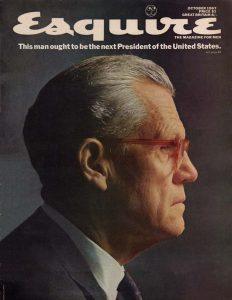
I knew a number of things about J. Irwin Miller, the former Cummins Engine CEO who financed Columbus, Indiana’s world-renowned collection of modernist architectural masterpieces. But when I read Nancy’s Kriplen’s recent short biography of him, I learned a lot I’d never suspected. Clearly one of the most distinguished Hoosiers of all time, among other things, Esquire magazine put him on its cover in 1967 saying that he should be the next President of the United States. That was a pipe dream, of course. Even had Nixon not been the Republican nominee, Nelson Rockefeller would have been the first choice of the traditional WASP liberal wing of the Republican Party. But it shows the regard in which he was held and his national stature. And it’s hard not to think he would have been a far better President than either Nixon or Rockefeller.
Kriplen’s book helps flesh out the Miller Model of civic leadership. I may share some additional material from it in a future post. But for now, I have a piece in the Atlantic examining Miller and Columbus as the small Rust Belt manufacturing city that never rusted. Here’s an excerpt:
A Rockefeller Republican, Miller was also a social progressive with national impact. He served on the boards of MoMA, the Ford Foundation, and Yale. A lifelong member of the Disciples of Christ, he was a key ally of Lyndon B. Johnson in getting the Civil Rights Act passed while serving as president of the National Council of Churches. Closer to home, he used his clout to get anti-discrimination ordinances passed in Columbus. Miller was globally minded but also deeply rooted in his community, a combination that steered the local conservative culture in a more moderate direction.
That moderation also helped Cummins and Columbus avoid the labor strife of other Midwest cities. When national unions attempted to organize Cummins, the employees instead elected to form their own, independent Diesel Workers Union, over the objections of the United Automobile Workers. The relationship between the Diesel Workers Union and firm was much warmer than usual, with Miller given honorary union membership. As he put it, “Unions are management’s mirror. They tell you things your own people won’t admit.”
The results speak for themselves. Cummins has remained a successful global enterprise. And Columbus has prospered, never experiencing a major period of decline. Today it’s still growing in population and adding jobs faster than the nation as a whole. It’s more educated than the country at large and boasts a GDP per capita higher than Portland, Minneapolis, and Houston.
Read the rest of the article at The Atlantic. This piece previously appeared on aaronrenn.com
Aaron M. Renn is The Urbanophile. He is on a mission to help America's cities thrive in the 21st century global economy by discarding old stereotypes and adopting new strategies based in progressive planning, economic, and branding principles aimed at creating sustainable, everyday places for the majority of Americans to live, work, and visit on an ongoing basis.












